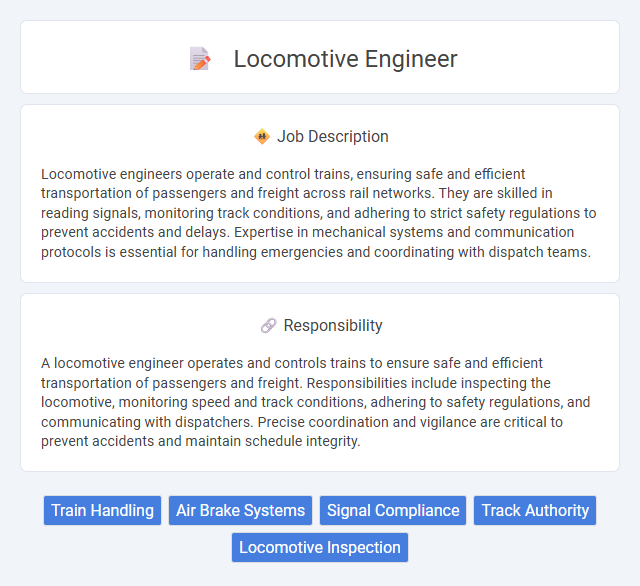
Locomotive engineers operate and control trains, ensuring safe and efficient transportation of passengers and freight across rail networks. They are skilled in reading signals, monitoring track conditions, and adhering to strict safety regulations to prevent accidents and delays. Expertise in mechanical systems and communication protocols is essential for handling emergencies and coordinating with dispatch teams.
Individuals with strong concentration, good physical health, and the ability to handle stressful situations may be well-suited for a locomotive engineer role. Those prone to anxiety or with health conditions that affect alertness might find the job challenging due to its demanding nature and responsibility for safety. Probabilistically, people who enjoy routine, have excellent problem-solving skills, and can remain calm under pressure tend to perform better in this occupation.
Qualification
Locomotive engineers must hold a high school diploma or equivalent, complemented by extensive on-the-job training or completion of a railroad training program. Federal regulations require engineers to obtain certification from the Federal Railroad Administration (FRA), which involves passing written and practical exams. Strong technical skills, attention to detail, and a thorough understanding of safety protocols are essential qualifications for operating and controlling train engines effectively.
Responsibility
A locomotive engineer operates and controls trains to ensure safe and efficient transportation of passengers and freight. Responsibilities include inspecting the locomotive, monitoring speed and track conditions, adhering to safety regulations, and communicating with dispatchers. Precise coordination and vigilance are critical to prevent accidents and maintain schedule integrity.
Benefit
Working as a locomotive engineer may offer competitive salaries and comprehensive benefits packages, including health insurance and retirement plans. There is likely strong job stability in the railroad industry due to ongoing transportation demand. Opportunities for overtime pay and career advancement could further enhance overall compensation and work experience.
Challenge
Locomotive engineer roles likely present significant challenges due to the need for precise attention to safety protocols and complex operational procedures. Navigating unpredictable track conditions and maintaining schedules under pressure probably require strong problem-solving skills and quick decision-making. The responsibility for passenger and cargo safety makes the job demanding, suggesting that engineers must consistently manage high stress levels.
Career Advancement
Locomotive engineers can advance their careers by gaining experience, obtaining additional certifications, and pursuing roles such as lead engineer, instructor, or safety supervisor. Progression often involves mastering complex equipment, adhering to safety regulations, and enhancing operational efficiency. Continuing education and specialized training increase opportunities for management positions within railway companies.
Key Terms
Train Handling
A locomotive engineer specializes in train handling, managing the operation and control of trains to ensure safe and efficient transportation. Their responsibilities include monitoring speed, brakes, and signal compliance while adjusting controls based on track conditions and schedules. Expertise in train dynamics and adherence to safety protocols is critical for minimizing risks and optimizing fuel consumption.
Air Brake Systems
Locomotive engineers must have specialized knowledge of air brake systems to ensure safe and efficient train operations, as these systems control the braking force across multiple rail cars. Mastery of pneumatic components, such as compressors, reservoirs, and brake valves, is essential for maintaining consistent air pressure and preventing failures. Proper inspection, troubleshooting, and maintenance of air brake systems directly impact the reliability and safety of locomotive braking performance.
Signal Compliance
Locomotive engineers must ensure strict adherence to signal compliance to maintain safe train operations and prevent accidents. Mastery of signaling systems, including understanding color codes, trackside signals, and electronic communication, is essential for timely and accurate responses. Consistent signal compliance supports efficient traffic management and regulatory standards in the rail industry.
Track Authority
Locomotive engineers are responsible for the safe operation of trains, requiring a deep understanding of track authority protocols that govern train movements on controlled sections of railway. Track authority ensures that engineers have explicit permission to occupy specific track segments, minimizing risks of collisions and enabling coordinated traffic management. Mastery of track authority procedures, including communication with dispatchers and adherence to signaling systems, is critical for maintaining operational safety and efficiency.
Locomotive Inspection
Locomotive engineers ensure safe and efficient train operations by performing thorough locomotive inspections that include checking brakes, engines, and safety equipment. Regular inspections help identify mechanical issues, prevent accidents, and maintain compliance with Federal Railroad Administration (FRA) regulations. Skilled knowledge of locomotive systems and attention to detail are essential for conducting accurate assessments and ensuring operational reliability.
 kuljobs.com
kuljobs.com